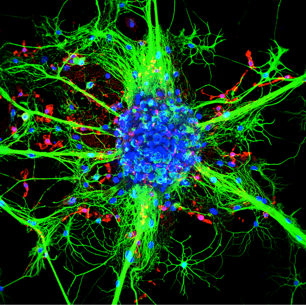You are here
Microglia: Where Friends Go Rogue in Neurological Disorders
EVENT:
Weekly Seminar | Not Open to the PublicHost:
Who Should Attend:
ResearchersEvent Flyer:
Speakers
Abstract
Microglia have numerous beneficial properties during development and after injury, such as the removal of inhibitors to reparative processes or the control of brain tumor growth. Yet, in many neurological conditions, the persistently activated microglia appear injurious and promote lesion expansion. This presentation considers factors that turn microglia from friend to rogue, including through single cell and spatial transcriptomic studies, and aging. Finally, inhibitors of injurious microglia activity applicable for clinical use are considered.

Publications
Sci Transl Med. 2020 Apr 1;12(537):eaay9924. doi: 10.1126/scitranslmed.aay9924.
Nat Neurosci. 2021 Apr;24(4):489-503. doi: 10.1038/s41593-021-00801-z. Epub 2021 Feb 18.

